WITH 2025 on the horizon we look back on some of the major news stories that helped shape Ireland in 2024.
Northern Ireland finally got its Assembly up and running at the start of the year, as a long-awaited deal was reached to return power-sharing to the region.
An agreement was reached in January between the British government and the DUP which “protected the North's place in the United Kingdom”, according to then Secretary of State Chris Heaton-Harris.
It brought an end to nearly two years of political deadlock which kept Stormont out of action and saw Sinn Féin's Michelle O'Neill finally able to take up the role of First Minister.
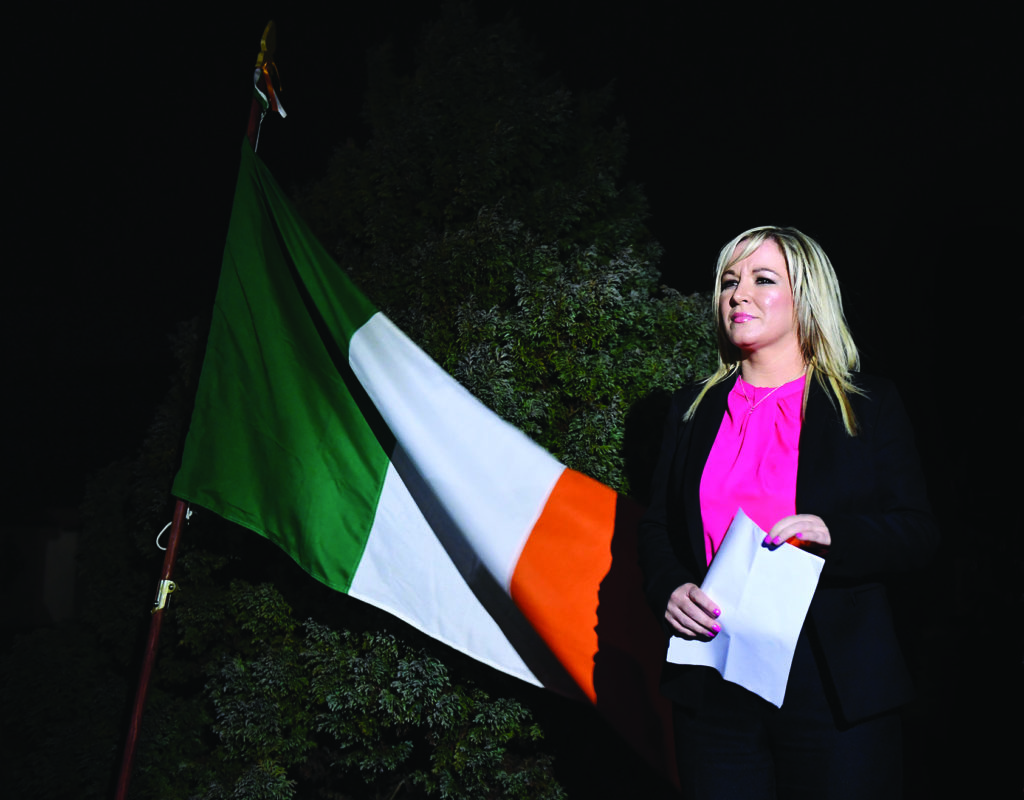 First Minister of Northern Ireland Michelle O'Neill
First Minister of Northern Ireland Michelle O'NeillIn January it was reported that 184 people were killed on the roads in 2023, a worrying rise in the numbers. The carnage continued throughout 2024. In the North it was a similar situation with the PSNI reporting a total of 71 deaths on Northern Ireland's roads during 2023, the highest number for eight years.
Elsewhere that month, the High Court in Belfast dismissed a libel case brought by Sinn Féin MLA Gerry Kelly against internationally renowned writer, broadcaster and Irish Post columnist Malachi O'Doherty. The case arose over two BBC radio interviews connected to the 1983 Maze Prison escape. O’Doherty refused to back down, the case was dismissed, and our man was awarded his costs.
The European Court of Human Rights announced that Ireland had launched legal action against the United Kingdom in January over the Northern Ireland Troubles (Legacy and Reconciliation) Act 2023 that would give amnesty to British soldiers and members of paramilitary groups in Northern Ireland during the Troubles.
One of the first things Britain’s new Labour government did after coming into power later in the year was to pledge to scrap the previous administration’s controversial bill.
Newly-appointed Northern Ireland Secretary Hilary Benn outlined the steps the British government would take to repeal and replace the legislation.
In the Republic Record homelessness figures were released by the Department of Housing, showing that in January, 13,531 people were making use of emergency accommodation, including over 4,000 children.
Homelessness was to be an ever-present topic throughout the year.
Immigration was another recurring theme during 2024, with anti-immigration protests taking place, accommodation ear-marked for International Protection Applicants attacked, and violence erupting at demonstrations.
Despite these sporadic incidents, no coherent far-right political grouping emerged, as has done across Europe. And the topic played no significant part in the general election in the Republic in November.
In March a report into the Troubles-era British Army spy known as Stakeknife concluded that he probably cost more lives than he saved.
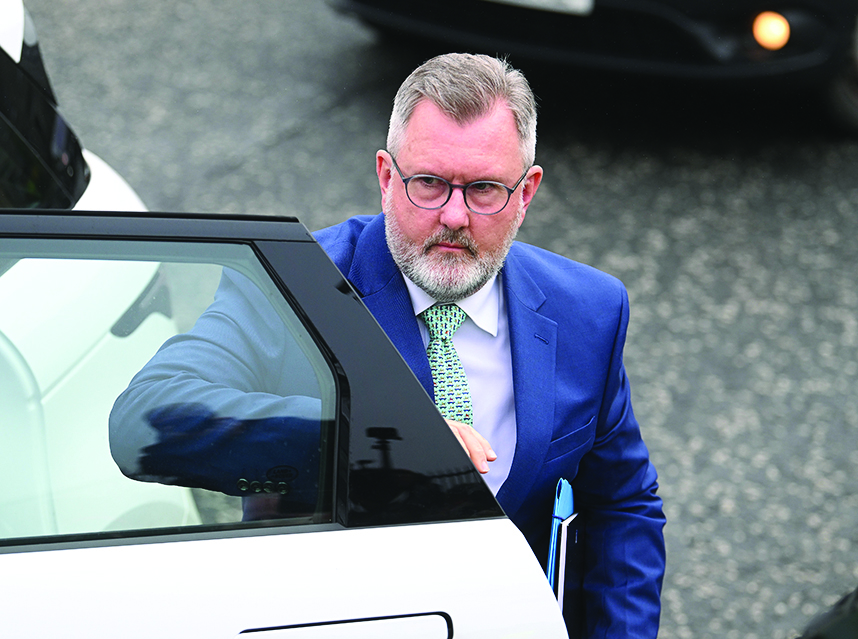 DUP leader Jeffrey Donaldson resigned in March following abuse allegations
DUP leader Jeffrey Donaldson resigned in March following abuse allegationsDUP leader Jeffrey Donaldson resigned in March. Shortly after his departure it was revealed that the MP for Lagan Valley had been charged with rape and other historical sexual offences, allegations he has strongly denied.
His wife Eleanor Donaldson faces five charges of aiding and abetting him between 1987 and 2008, in connection with the alleged offences. offences. The pair were arrested in March and appeared at Newry Magistrate’s Court in April and again in July.
Donaldson, who has since resigned as an MP, is accused of 18 sex offences involving two alleged victims. He is charged with rape, plus four counts of gross indecency and 13 counts of indecent assault
The couple appeared in court again in October where they gave not guilty pleas to all of the charges against them. A trial date has been set for March 24, 2025 and is scheduled to last up to two weeks. The pair have been released on continuing bail until then
In April Leo Varadkar unexpectedly tendered his resignation as Taoiseach to President Michael D. Higgins at Áras an Uachtaráin. Varadkar was the first Taoiseach from an ethnic minority group, as well as Ireland's first — and the world's fifth — openly gay head of government. He is also the tallest Taoiseach Ireland has ever had, about an inch taller than “the long fellow”, Éamon de Valera.
Simon Harris succeeded Leo Varadkar as Fine Gael leader on March 24, 2024, following an uncontested leadership election. Prior to becoming party leader, Harris had served in various ministerial roles, including Minister for Health and Minister for Further and Higher Education, Research, Innovation and Science.
His elevation to Taoiseach marked the first time three individuals held the office within a single Dáil term, reflecting a period of significant political transition in Ireland.
The financial cost of a united Ireland was calculated this year – and the figures are staggering. Researchers at the Institute of International and European Affairs (IIEA) published a paper in April which focuses on subvention, meaning the shortfall between what a nation raises in taxes and what it spends on public service.
This particular study examined what would happen in a united Ireland scenario based on Northern Ireland’s financial history and suggested it could cost between €8bn and €20bn a year to reunify the island.
Authors Professor John Fitzgerald and Professor Edgar Morgenroth argued that the Republic of Ireland would be put under “huge financial pressure” by absorbing Northern Ireland.
However, the authors did suggest that in the long-term the cost of unification could be substantially reduced if Northern Ireland made major changes in its economy in order to raise its productivity.
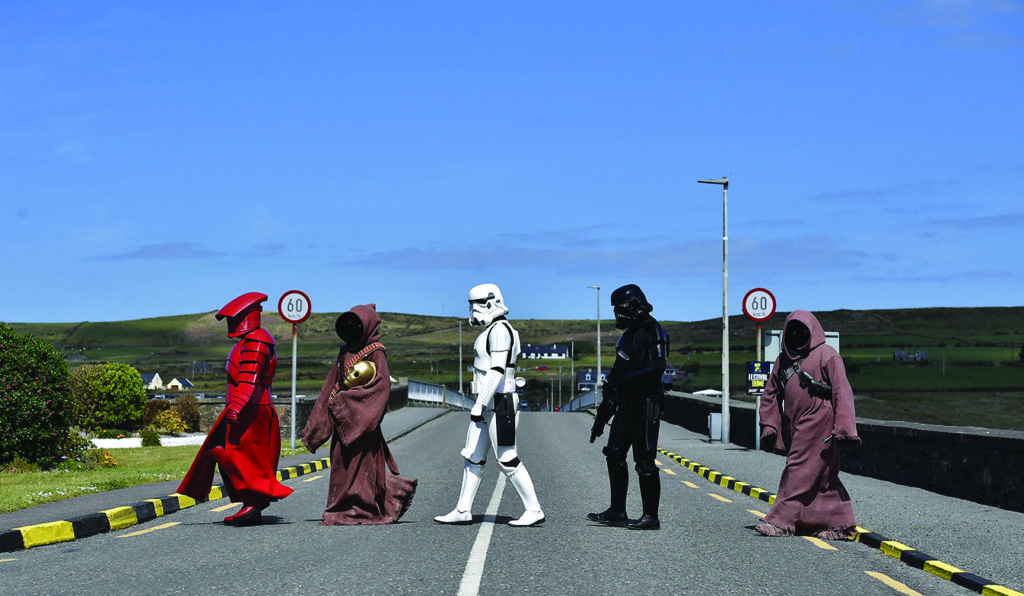 Star Wars hit the headlines again this year
Star Wars hit the headlines again this yearThe BBC reported on a banned Star Wars episode from 1990. The Troubles were still raging in Northern Ireland at the time, so it was decided that an episode which touched on the reunification of Ireland would probably not be helpful. The episode was called The High Ground, and at one point the android character Data, played by actor Brent Spiner, talks about the "Irish unification of 2024" as an example of violence successfully achieving a political aim. It was shown once in the US, but both the BBC and RTÉ decided that this was much too inflammatory.
According to the BBC, Sky reportedly aired an edited version in 1992, cutting the crucial scene. Whether Captain Kirk ever said “Beam me up Ulster Scotty” has not been revealed. But probably not.
In May an Irish cuckoo returned to its homeland after an epic journey which saw it spend the winter in Africa.
The bird, named Cuach KP, is one of three fitted with satellite tags as part of a new Cuckoo Tracking Project launched last summer.
It landed home in Killarney National Park in Kerry, where it departed from last year after being fitted with a tag.
Probably the only community not celebrating the return was the pipit, a bird of meadows and moorland. The Irish name for the pipit is pípéad, but it also glories in the name ‘banaltra na cuaiche’, the cuckoo’s nurse. The summer visitor strongly favours the pipit’s nest as a squat – after having unceremoniously tossed out the pipit’s eggs.
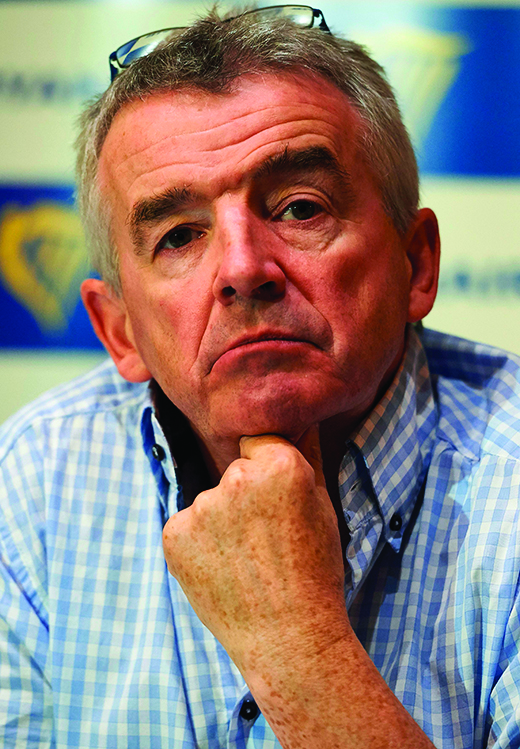 Ryanair Group CEO Michael O'Leary
Ryanair Group CEO Michael O'LearyRyanair warned on several occasions during the year that it would have to put its fares up. The airline said that its hands were tied.
One reason given was the Dublin Airport passenger cap. Another emerged from the late delivery dates of B737-MAX 8200 aircraft The travelling public meanwhile was outraged at this response to market forces. But it left Michael O’Leary unfazed. As he often says: Ryanair flights are full of people who swore they’d never fly Ryanair again.
In April an inquest into the Stardust fire returned a verdict of unlawful killing. The disaster occurred on February 14, 1981, in Artane, Dublin, when a nightclub fire claimed 48 lives and injured over 200. Faulty emergency exits and overcrowding exacerbated the tragedy.
Public outcry demanded accountability, yet initial investigations were inconclusive. But finally this year the families of the victims and survivors were finally given justice.
Tension in the Middle East continued throughout the year.
Tánaiste Micheál Martin described Israel's bombing campaign in Gaza as "barbarity". During a meeting with Egyptian foreign minister Sameh Shoukry he discussed Irish and European plans to recognise the State of Palestine.
In May the New York–Dublin Portal connecting the two cities via video screens as part of a public art project was temporarily turned off. This followed reports that participants were behaving inappropriately. It was eventually restarted, but with rigid safeguards in place to prevent anti-social behaviour being beamed across the Atlantic.
Reports in the New York Post newspaper said that people in Dublin had been exposing body parts, making inappropriate gestures and holding up footage of 9/11.
The Conservative Party in Britain continued to implode after the disastrous premierships of Boris Johnson and Liz Truss. Rishi Sunak tried to steady the Good Ship Tory, but he just wasn’t up to it. The goings-on in government and in No 10 were like a cross between a Hammer Horror movie and a Carry On film.
Threats to Sunak’s leadership gave rise to a chorus of jokes and cartoons roughly on the lines of “they’re very small shoes to fill” a reference to Prime Minister Sunak’s modest height — 5ft 6ins.
He was pictured walking across Horseguards’ Parade between David Cameron and James Cleverly (both over 6ft). One observer said that the prime minister looked like a page boy alongside the groom and best man at a wedding. Politics is a cruel trade.
By July, Prime Minister Sunak had had enough and called an election, much to the dismay of most of his party. Many knew they would be out of a job after the election.
Labour, unsurprisingly, won. Relations between Britain and Ireland were immediately reset. This was helped by the fact that Sir Keir Starmer’s chief of staff is Morgan McSweeney from Macroom, Co. Cork.
The results were welcomed in Ireland, with Taoiseach Simon Harris one of the first to call and congratulate the Prime Minister Starmer on his win.
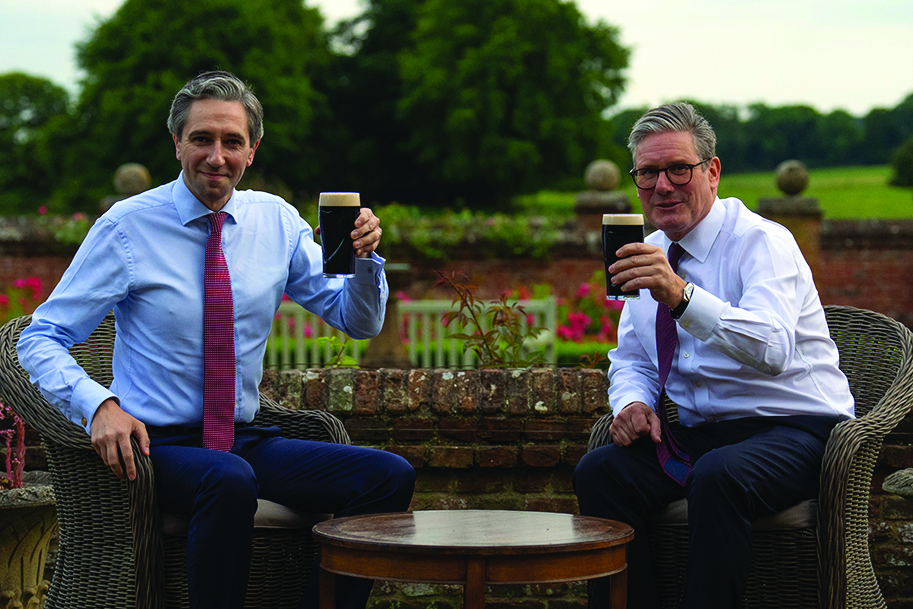 British Prime Minister Keir Starmer (R) and Irish Taoiseach Simon Harris enjoy a pint of Guinness together at Chequers on July 17, marking the first face-to-face meeting for the leaders since the UK general election earlier that month
British Prime Minister Keir Starmer (R) and Irish Taoiseach Simon Harris enjoy a pint of Guinness together at Chequers on July 17, marking the first face-to-face meeting for the leaders since the UK general election earlier that monthWithin weeks, Taoiseach Harris had been invited to formally meet with Mr Starmer at his Chequers summer home. There the pair enjoyed pints of Guinness and dinner, where they discussed their “shared aim of a reset in British-Irish relations”.
In one of the many twists and turns in the election, Pat Cullen stood down as chief executive of the Royal College of Nursing in order to seek the nomination as Sinn Féin candidate for Fermanagh and South Tyrone, once held by Bobby Sands MP, in the general election.
She won by over 3,000 votes. The previous Sinn Féin MP, Michelle Gildernew, had once held the seat by a mere 4 votes.
Irish politicians took full advantage of Leinster House's cut-price alcohol prices last year, as new figures in 2024 revealed more than 10,000 pints of Guinness were knocked back in the Dáil's two bars. A total of 10,031 pints of plain were supped in the Houses of the Oireachtas two licensed premises in 2023, as Guinness emerged as the biggest seller amongst politicians and Leinster House staff.
And with a pint of the black stuff at Leinster House costing just €5.20 (approx. £4.50) — compared to around €7 or €8 in most nearby city centre bars.
Little evidence has emerged to show that figures for 2024 will be radically different.
The Northern Ireland Assembly was recalled from its summer recess to address the riots which erupted in Belfast in August.
A weekend of violence and disorder erupted in the city following an anti-immigration protest held outside Belfast City Hall on Saturday, August 3. The rioting echoed that which was witnessed across England the previous week following the killing of three young girls at a holiday camp in Southport.
Some 600 protestors joined the demonstration in Belfast and several businesses were targeted during the disorder which saw fireworks thrown and incidents of assault, criminal damage and arson reported by the PSNI.
First Minister Michelle O’Neill and deputy First Minister Emma Little-Pengelly returned from their summer holidays to meet with PSNI Chief Constable Jon Boutcher on the disruption.
A man was charged over online threats made to Lilian Seenoi-Barr, the Mayor of Derry City and Strabane. In September the PSNI confirmed that 45 arrests had been made relating to the disorder, of which 35 people have been charged, including an 11-year-old boy.
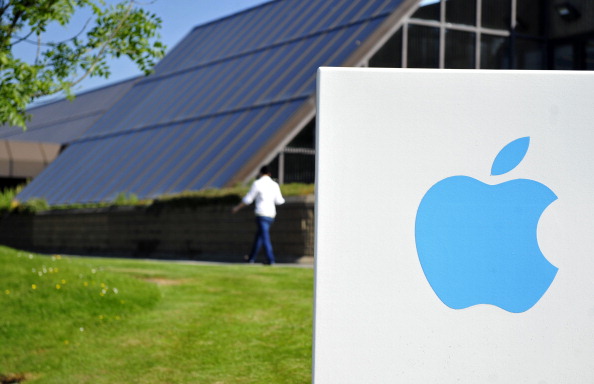 Apple must pay Ireland €13b (Picture: Getty Images)
Apple must pay Ireland €13b (Picture: Getty Images)In September the Court of Justice of the European Union ruled that Apple Inc. must pay €13billion to the government of Ireland as compensation for extraordinarily low taxes levied by Ireland against Apple.
As Halloween approached, a social media rumour began spreading in Ireland that a Halloween parade would take place on O'Connell Street in Dublin. The bogus message attracted hundreds of people into the city. The hoax led to brief public transport disruption and gardaí were faced with the problem of dispersing a large, disappointed crowd to disperse.
At the beginning of November President Higgins dissolved the Dáil at the request of Taoiseach Harris. A three-week election campaign began for a general election on Friday, November 29.
A fairly disastrous campaign by Fine Gael and only a slightly more competent campaign from a battered Sinn Fein, left Fianna Fáil emerging with the largest number of seats. Sinn Féin limped home second and Fine Gael third.
The campaign for Fine Gael was crystallised by one fateful encounter for Taoiseach Harris. In what has been described as a disastrous political own goal, he severely dented his genial image when he had a run-in with a care worker in Cork.
The Taoiseach came across as boorish and uncaring — neither of which he is — but the image stuck.
Harris’ moderate performance on RTÉ’s first leadership debate also did him few favours. Post mortems will be held by the Fine Gael party bosses, but Harris is, on balance, likely to hold on to his job — simply because few of the other Fine Gael ‘big beasts’ performed particularly well in the run-up to the election.
Unlike the rest of Europe, the electorate plumped for the centre, incumbent parties. Whatever shade of coalition emerges, Micheál Martin will be Taoiseach come 2025. The Green Party was decimated, with only one TD being returned. This was not unexpected, even though Ireland is continually seeing the effect of climate change with recurrent storms, incessant rain, flooding and in the summer aberrantly high temperature. The Green Party was the only one to have this topic as a central plank of their manifesto.
Sinn Féin were at one time expected to be the biggest winners in any general election, with Mary Lou McDonald ear-marked to become Ireland’s first woman Taoiseach. But several significant scandals, and what was seen as incoherent policies on homelessness and immigration, cost them heavily at the ballot box.
Michael McMonagle, a former Sinn Féin press officer, pleaded guilty to child sex offences. It had earlier been revealed that two senior Sinn Féin figures had provided him with references for a position at the British Heart Foundation while he was under police investigation.
In October 2024, Niall Ó Donnghaile, a Sinn Féin senator, resigned after admitting to sending inappropriate messages to two teenage males, aged 16 and 18. The party's handling of this incident, including initial statements about the recipients' ages, led to public criticism and allegations of a cover-up.
Then in October, long-serving TD Brian Stanley resigned from the party following an internal complaint. He subsequently contested and won his Dáil seat as an independent candidate, highlighting internal discord within the party.
In October 2024, TD Patricia Ryan resigned from Sinn Féin amid disagreements over the party's approach to immigration and local constituency issues. Her departure further underscored tensions in party management.
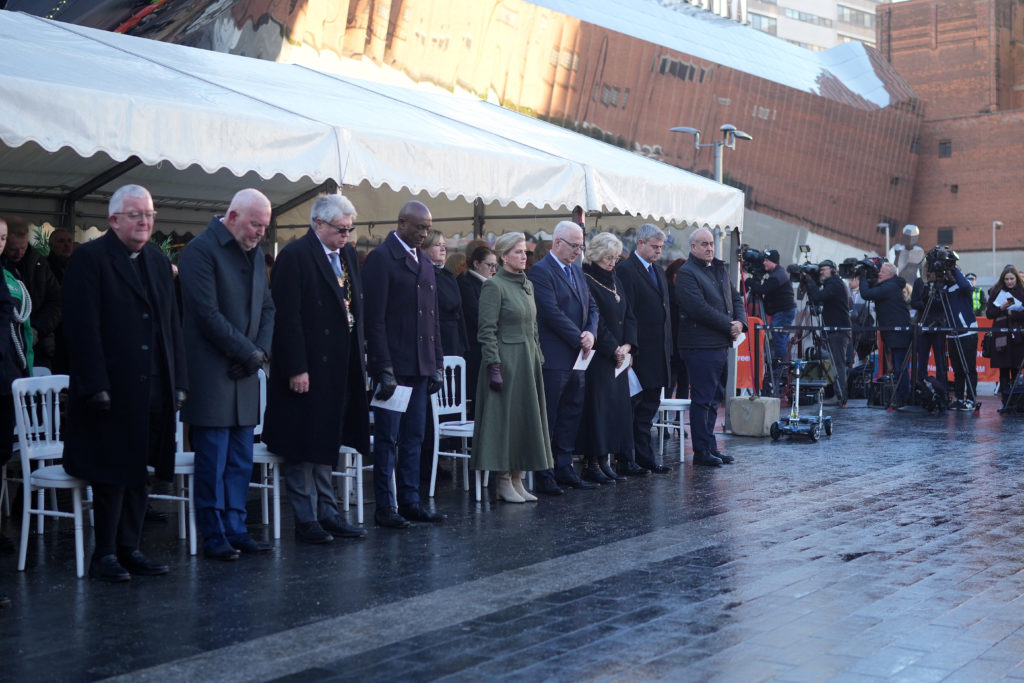 A memorial service marked the 50th anniversary of the Birmingham pub bombings on November 21, 2024 in Birmingham
A memorial service marked the 50th anniversary of the Birmingham pub bombings on November 21, 2024 in BirminghamThe 50th anniversary of the Birmingham bombings fell in November. Irish President Michael D Higgins was among those who paid tribute on the sombre occasion, which saw a ceremony held in the city. He recalled the “unspeakable tragedy” caused when two bombs exploded in Birmingham on November 21, 2024.
Two public houses were targeted in the west Midlands city, The Mulberry Bush and the Tavern in the Town. The explosions killed 21 people and injured at least 170 more.
Six Irishmen - who became known as the Birmingham Six - were wrongly convicted of the bombing. Hugh Callaghan, Paddy Hill, Gerry Hunter, John Walker, Richard McIlkenny and Billy Power served 16 years in prison before their convictions were overturned.
Investigations into the incident have continued over the years, although no one has ever been convicted for the attacks and no one has ever admitted responsibility.
History repeated itself in November when former US President Donald Trump secured a return to the White House four years after the end of his first term. He convincingly powered past the 270 electoral votes needed to win soon after the vote counts began. The final total was 312 to Trump against Kamala Harris’ 226.
Taoiseach Simon Harris was among the many international leaders to congratulate Trump following his win. Mr Trump will take up the position as the 47th President of the US in January 2025.
As it happens Donald trumps his predecessors in at least one historical context. They might call him Don the Con, but Donald Trump is not only the first US President to be impeached, he is the only living US president whose ancestors didn't own slaves, a Reuters report said. Even Barack Obama is descended from slaveholders, through his white mother's side of the family (some of whom came from Offaly). But Donald Trump’s ancestors arrived in America long after slavery had been abolished, so his hands, on this topic at least, are clean.
His mother Máiri Anna Nic Leóid was from the Outer Hebrides. A native Gaelic speaker from the island of Harris and Lewis, she was one of ten children brought up in a croft in Tong on the east coast, and still a Gaelic-speaking stronghold. She emigrated to America in 1930. The only involvement in slavery her ancestors could possibly have had was as slaves, back in the 9th century when the Vikings came a–visiting looking for cheap labour.
Trump’s father had the frankly surprising name of Frederick Christ Trump. He was born in the Bronx to German parents — one Friedrich Trump and Elizabeth Christ, again with no known links to slavery.
So although many in Europe (and the US) are exceedingly wary of his presidency, as regards slavery he can hold his head up high.
He has no Irish roots, but nonetheless has invested heavily in Ireland, opening a golf course and hotel at Doonbeg, Co. Clare.
In December a judge ruled that MMA star Conor McGregor would pay the legal costs of a woman who accused him of raping her.
A jury had found McGregor liable for assault in a civil case taken by Nikita Hand and ordered him to pay Ms Hand almost €250,000 (£207,000) in damages. He was further ordered to pay her legal costs
On foot of the court finding for Ms Hand, several businesses immediately sought to dissociate themselves, with retailers pulling products associated with him off the shelf.
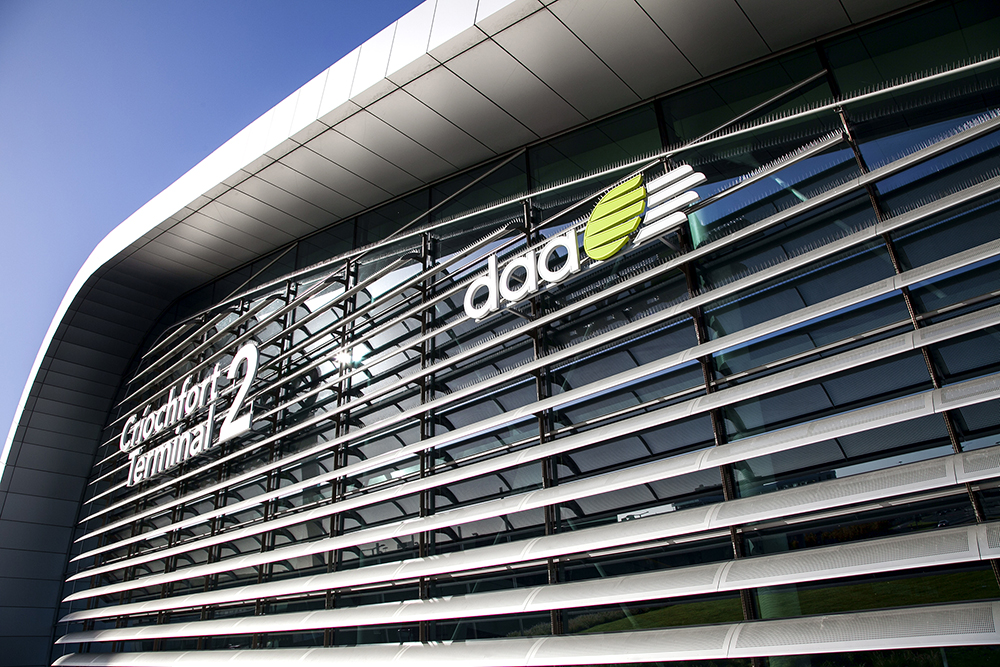 Dublin Airport
Dublin AirportA Dublin Airport-based priest hit back in 2024 at a move to ban the Christmas tradition of blessing aircraft every Christmas by vowing to find a way to continue the long-running custom.
The Dublin Airport Authority [DAA]confirmed it was bringing an end to the 76-year-old ritual of a priestly blessing of aircraft on Christmas Day, due to security concerns.
The DAA said access to the airside area is now restricted to airport operations only, which means non-operational activities like the blessing of aircraft can't take place there any longer.
However, Dublin airport chaplain, Fr. Des Doyle – who has taken holy water onto the airfield to bless planes every Christmas Day for the past 16 years - insists there is still an acceptable way to maintain the tradition. The airport-based cleric has pledged to continue the ritual, albeit from the altar or even when airborne, according to The Irish Catholic.
Previous reports had suggested that a request for a non-religious blessing had triggered the change, but airport chiefs have clarified that it was solely down to security reasons.
The custom first began in 1947 with Aer Lingus planes, which were named after Irish Christian saints. It expanded to include other aircraft over the years, but with increased air traffic, individual blessings became impractical.
But with air travel now the safest way to get about, and tragically road traffic collisions on the increase, many have said that Fr Doyle would be better outside the terminal building blessing the traffic. The aircraft are probably less in need of divine protection.
And finally, perhaps the least surprising report of the year.
In April, Free Now, a Europe-wide taxi service conducted a survey of drivers to ascertain who the chattiest passengers were.
The second-most chatty are, surprisingly, the Brits. But who do you think are the chattiest? Go on, have a guess!
Do you reckon it’s, say, the Finns? Or maybe the Germans, famed for their banter and their conversational prowess? Or you might think it’s the French with their renowned 'ow you say, le chit-chat et camaraderie. No, it’s none of them.
Come on! The answer’s staring you in the face! Yes, it's us! The Irish. Who would have thought?

